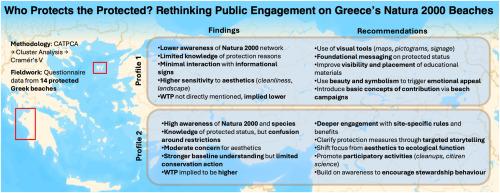谁保护被保护的人?重新思考公众对希腊Natura 2000海滩的参与
IF 5.3
2区 环境科学与生态学
Q2 ENVIRONMENTAL SCIENCES
引用次数: 0
摘要
欧洲的自然2000 (N2k)网络保护生物多样性,但公众对其海岸遗址,特别是海滩的认识仍然有限。其中许多地区缺乏正式的管理,受到季节性旅游的压力,在洗浴期之外的保护工作很少。这项研究调查了公众脱离是源于冷漠还是仅仅是缺乏意识。利用希腊14个受保护海滩的数据,我们分析了游客对N2k的熟悉程度、对该网站的满意度以及支持其保护的意愿。应用CATPCA、聚类分析和Cramer's V,我们确定了两个访问者档案。1号人对保护措施的认识和理解程度较低,需要进行基础教育和标识。图2显示对保护限制的认识较高,但理解有限,表明需要参与性和体验性工具。根据这些情况量身定制的外展活动可以加强环境教育和公众参与,加强对管理不足的N2k海岸遗址的公民支持保护。本文章由计算机程序翻译,如有差异,请以英文原文为准。

Who protects the protected? Rethinking public engagement on Greece's Natura 2000 beaches
Europe's Natura 2000 (N2k) network safeguards biodiversity, yet public awareness of its coastal sites, especially beaches, remains limited. Many of these areas lack formal management and are subject to seasonal tourism pressures, with minimal conservation outreach outside the bathing period. This study investigates whether public disengagement stems from indifference or simply a lack of awareness. Using data from 14 protected beaches in Greece, we analyzed visitor familiarity with N2k, satisfaction with the site, and willingness to support its protection. Applying CATPCA, cluster analysis, and Cramer's V, we identified two visitor profiles. Profile 1 had low awareness and minimal understanding of protection measures, calling for foundational education and signage. Profile 2 showed higher awareness but limited understanding of conservation restrictions, suggesting a need for participatory and experiential tools. Tailoring outreach to these profiles can enhance environmental education and public engagement, strengthening citizen-supported conservation in under-managed coastal N2k sites.
求助全文
通过发布文献求助,成功后即可免费获取论文全文。
去求助
来源期刊

Environmental Development
Social Sciences-Geography, Planning and Development
CiteScore
8.40
自引率
1.90%
发文量
62
审稿时长
74 days
期刊介绍:
Environmental Development provides a future oriented, pro-active, authoritative source of information and learning for researchers, postgraduate students, policymakers, and managers, and bridges the gap between fundamental research and the application in management and policy practices. It stimulates the exchange and coupling of traditional scientific knowledge on the environment, with the experiential knowledge among decision makers and other stakeholders and also connects natural sciences and social and behavioral sciences. Environmental Development includes and promotes scientific work from the non-western world, and also strengthens the collaboration between the developed and developing world. Further it links environmental research to broader issues of economic and social-cultural developments, and is intended to shorten the delays between research and publication, while ensuring thorough peer review. Environmental Development also creates a forum for transnational communication, discussion and global action.
Environmental Development is open to a broad range of disciplines and authors. The journal welcomes, in particular, contributions from a younger generation of researchers, and papers expanding the frontiers of environmental sciences, pointing at new directions and innovative answers.
All submissions to Environmental Development are reviewed using the general criteria of quality, originality, precision, importance of topic and insights, clarity of exposition, which are in keeping with the journal''s aims and scope.
 求助内容:
求助内容: 应助结果提醒方式:
应助结果提醒方式:


